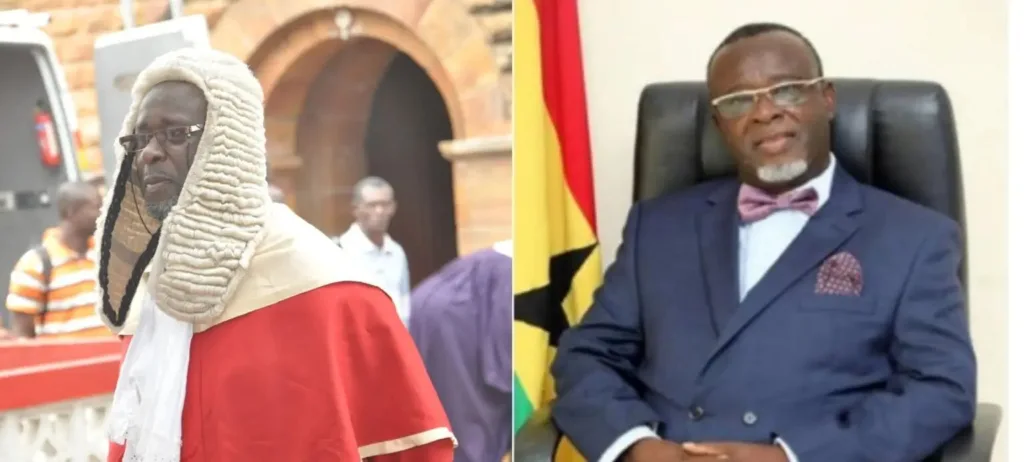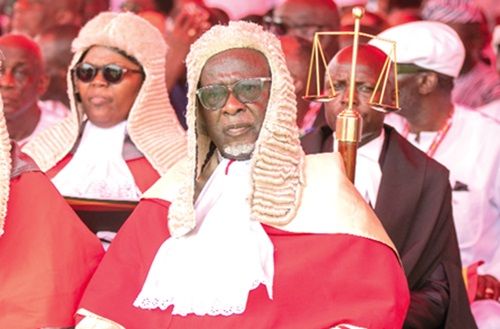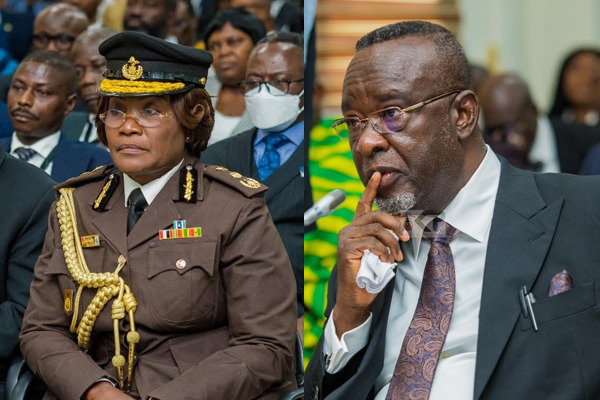Chief Justice nominee, Justice Paul Baffoe-Bonnie, has revealed that he voluntarily resigned from the Ghana Prisons Service more than three decades ago in order to marry his wife, who was then a junior officer in the same institution.
Appearing before Parliament’s Appointments Committee on Monday, November 10, 2025, Justice Baffoe-Bonnie recounted that at the time, service regulations prohibited senior officers from marrying junior officers. Faced with the choice between continuing his military-style career and building a family, he said he chose the latter.
“I joined the Prison Service in 1988 and underwent six months of military training before being posted to Sekondi,” he told the committee. “That was where I met my wife, who was then a young recruit starting her career. In 1990, I was told I could not marry her because as a Deputy Superintendent, I couldn’t marry a junior officer. So, I decided to leave so that she could continue.”
The revelation offered a rare glimpse into the personal sacrifices behind the life of one of Ghana’s most prominent judges.
Justice Baffoe-Bonnie’s disclosure resonated beyond his personal life, sparking a broader discussion about gender, career balance, and institutional policies in Ghana’s public service. His experience underscores how workplace regulations—especially in the uniformed services—have historically influenced family decisions and gender equality in professional advancement.
For Ghana and many African countries, stories like this shed light on the difficult choices individuals, particularly women, have faced in balancing family aspirations with professional rules rooted in colonial-era traditions. The issue also raises questions about how far public institutions have come in adapting their regulations to support both marriage and career progression.

Justice Baffoe-Bonnie said his decision to resign from the Ghana Prisons Service in 1990 became a defining moment in his professional journey. After leaving the service, he joined the Internal Revenue Service (IRS) as a Legal Officer in charge of the Eastern and Volta Regions, a role he held for two years.
He noted that his time at the IRS helped him develop a deeper understanding of *administrative law, tax compliance, and public sector governance, experience that would later prepare him for his eventual entry into the judiciary in *1992.
“My work at the IRS was crucial in shaping my legal outlook,” he explained. “It gave me hands-on experience in policy enforcement and dispute resolution, which became valuable when I joined the bench.”
Justice Baffoe-Bonnie went on to build an illustrious legal career, rising through the ranks of Ghana’s judiciary to serve as a *Justice of the Supreme Court. His nomination as *Chief Justice follows the removal of Justice Gertrude Araba Esaaba Sackey Torkornoo, whose tenure ended amid controversy and pending legal challenges.
Justice Baffoe-Bonnie’s wife, Patience Baffoe-Bonnie (Esq.), whom he chose to support by leaving the service, is today the Director-General of the Ghana Prisons Service—the first woman to hold the position in Ghana’s history.
Her leadership represents a milestone in gender advancement within Ghana’s security institutions, long dominated by men. She oversees prison reforms aimed at improving rehabilitation, staff welfare, and human rights conditions in correctional facilities across the country.
Observers say her journey—from a junior officer in the late 1980s to the top of the service—symbolizes both perseverance and changing attitudes toward women in law enforcement.

During the late 1980s and early 1990s, Ghana’s Prisons Service operated under strict disciplinary and social codes, many inherited from the British colonial system. These regulations often restricted fraternization or marriage between officers of different ranks, arguing that such relationships could compromise command structure and discipline.
Over the years, however, reforms in the Prisons Service and other security agencies have relaxed some of these policies. Today, inter-rank marriages are not uncommon, provided officers disclose their relationship and follow administrative procedures to avoid conflicts of interests.
Justice Baffoe-Bonnie’s Love and Leadership
Justice Baffoe-Bonnie’s personal story, therefore, not only reflects the rigidity of the past but also illustrates how institutional culture has evolved to accommodate more inclusive and humane policies.
The Chief Justice nominee’s account also adds to the ongoing national conversation about how Ghana’s public sector can better accommodate family life without compromising professional standards.
Experts note that while workplace ethics and discipline are vital, outdated restrictions often deter talented individuals from pursuing long-term careers in certain institutions.
Dr. Kojo Asare, a governance lecturer at the University of Ghana, observed that “Baffoe-Bonnie’s story shows the personal cost of rigid institutional frameworks. It’s a reminder that reforms should not only focus on efficiency but also on fairness and humanity.”

Since joining the judiciary in 1992, Justice Baffoe-Bonnie has earned a reputation for fairness, discipline, and a deep understanding of constitutional law. He has served on several landmark cases before the Supreme Court, including constitutional petitions, electoral disputes, and economic crime trials.
His life story, marked by both professional excellence and personal sacrifice, offers an insight into the values shaping his approach to leadership and justice.
“It was not an easy decision to make,” he told the Appointments Committee. “But looking back, it taught me to always put integrity and family above personal ambition.”
Justice Paul Baffoe-Bonnie’s revelation about leaving the Ghana Prisons Service for love is more than a personal anecdote—it is a reflection of Ghana’s evolving social and institutional landscape. His choice, once shaped by rigid rules, now stands as a testament to how personal conviction can redefine professional destiny.
As Parliament considers his nomination, his story serves as a reminder that leadership often begins with the courage to make difficult, principled decisions—both at home and in public life.
Read also: Political Interference and Elite Complicity Hamper Ghana’s Fight Against Illegal Mining

